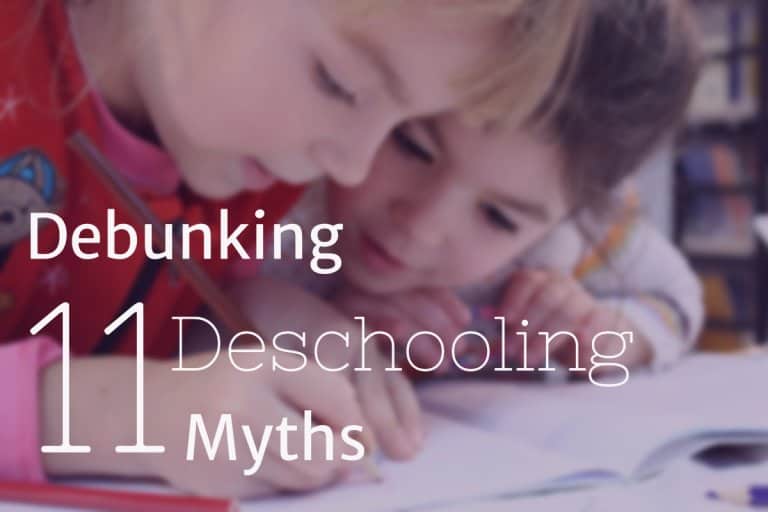Debunking 11 Myths about Deschooling

What is Deschooling?
To ensure that we're all on the same page, here's a quick intro to deschooling: Deschooling is a period of adjustment after leaving a school environment when both the parent(s) and child(ren) disengage from a school mindset and adjust to a completely new way of education that is not based on norms, structure, culture, and organizational expectations.
So, this means "no school," right? Wrong! That's actually myth #1:
Deschooling Myths
Myth #1 “Deschooling” Means No School
“Deschooling” describes the period of time needed for parents and students to adjust to switching from a traditional school setting to homeschool.
Myth #2 We’re Ready to Jump Right In
Don’t try to skip the transition period! A good rule of thumb: Allow 1 month of “deschooling” for every year your child was in school. Take it slow! New roles, expectations, and schedules take time to adjust to.
Myth #3 It’ll Be Easy
Probably not. It’s vital to give yourself time, give yourself grace, and give yourself credit. Celebrate small victories (daily!). Integrate lots of humor. Don’t try to do too much. You’ll get there!
Myth #4 It Must Look Just Like School
Homeschooling doesn’t, and won’t, look just like school. Homeschooling offers incredible flexibility. Your schedule can flex around chores, sleep needs, and your child’s peak learning times. Learning will happen outside of textbooks. You don’t need to study every subject every day. Field trips will expand your classroom. You won’t be molding every lesson around upcoming tests or school standards.
Myth #5 I Have to Act Like a Real Teacher
Homeschool teachers get tons of one-on-one interaction. You are your child’s support, resource, coach, and tutor. You hold them accountable, encourage them, and facilitate their learning. Be confident in your new role; with time, it’ll feel natural.
Myth #6 Everything Must Be Planned Out from the Start
Deep dark secret: No homeschooler ever got it all right the first time. Especially during deschooling. Give yourself permission to try things, ditch them, and try different things. It’s ok to switch gears, even mid-semester. Be flexible. There are mountains of options and resources.
Myth #7 I’m The Teacher, So I Plan Everything
Allowing your child input can help smooth the ride. Ask what they liked about school, and integrate that if possible. Follow their interests. Find out what’s most important to them in homeschooling. Allow them to choose when and where they do school, and in what order.
Myth #8 Feelings Don’t Matter
It’s a big change! Allow your kids to mourn things they may miss about school. Listen. Some things your child may face as they process:
- They may rebel against their new schedules, curriculum, or your role as their teacher.
- They may feel lost (without familiar schedules); apathetic; uncertain about meeting other homeschoolers.
- They may have concerns about grades, missing tests, etc.
- If they left school because of a negative situation (bullying, bad grades), they may need time to heal and regain confidence.
Myth #9 Deschooling Only Benefits the Student
Parents, you need time to retrain your brain, too. Society has drilled into our heads what “normal” learning looks like, and it takes time to adjust to a new way of operating. It’s also an emotionally draining time as you help your child adjust, and your whole day shifts to make room for homeschooling.
Myth #10 I Can Do This on My Own
There are lots of homeschooling groups out there, even online. Find your community. You don’t have to listen to everyone’s advice, but do seek out homeschool peers to support and encourage both you and your child.
Myth #11 You Have to Give a Satisfactory Answer to Everyone
You’ll never make everyone happy. Seek out supportive people, but also have a quick answer ready for skeptics: “We’re just trying something else,” or “We’re just doing what works for our family right now.” Write down your reasons for homeschooling—let your child help—so that when things get rough, you can remind yourself.







How long should the deschooling period last?
You'll never get a consensus on this question. It will depend on you, your kids, and your family as a whole. It is common for new homeschoolers (kids) to have a hard time. The transition of expectations can be challenging and confusing.
As a general rule of thumb you can say that:
Best of luck if you're just starting out!